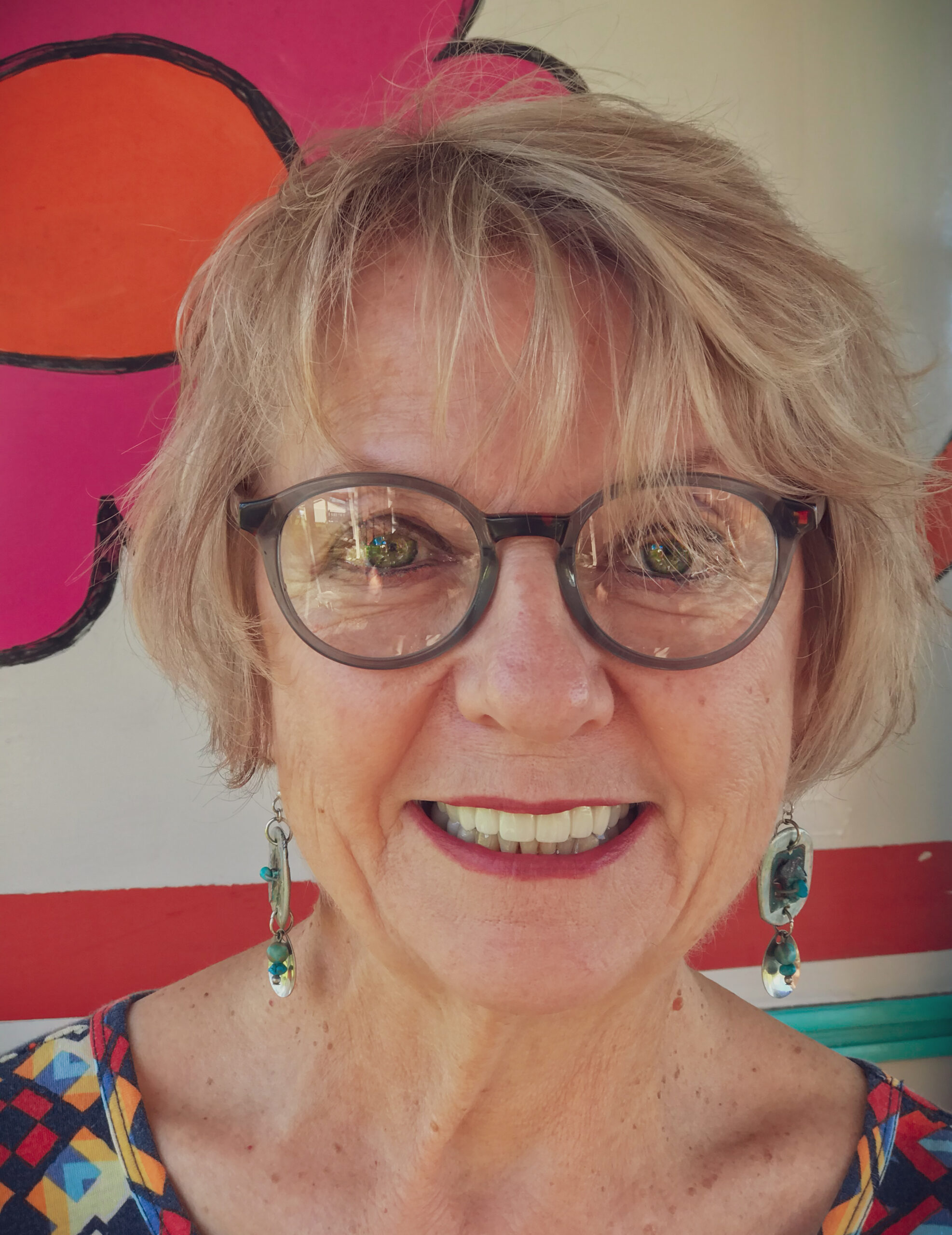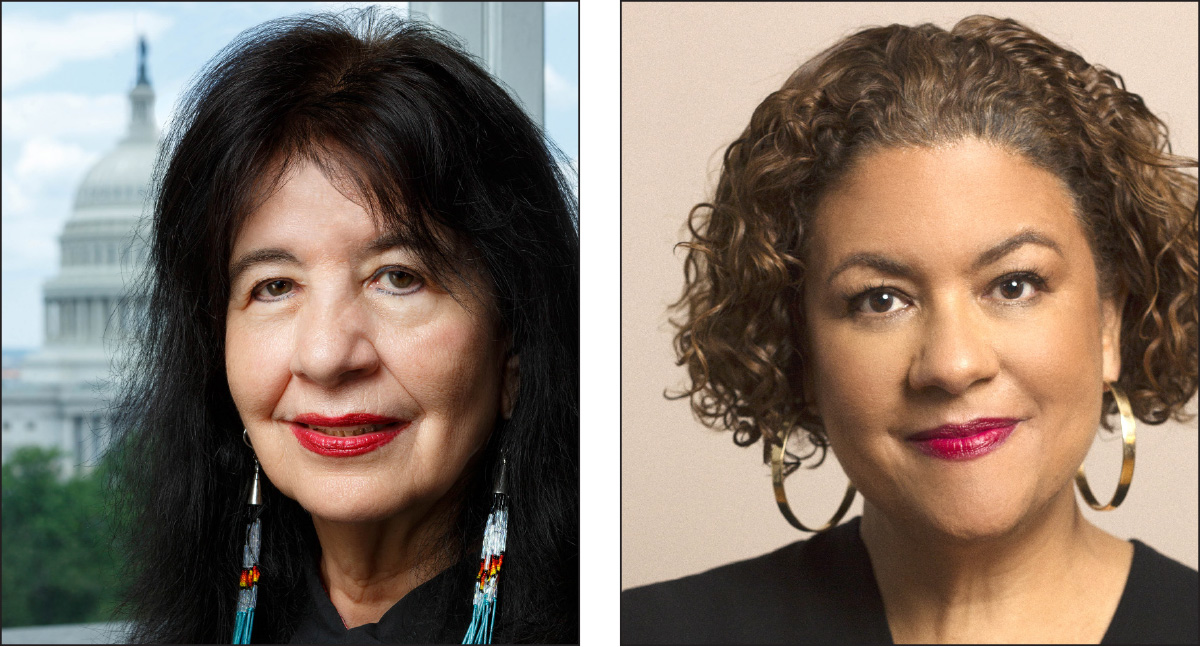One bright spring morning a friend sent me a link to a poetry event sponsored by The Andrew W. Mellon Foundation. My first thought was that this event would probably be way over my head. Two very intelligent women in conversation about poetry, was I worthy? Would I be able to relate to these women?
After doing some soul-searching, I realized that I truly love poetry. I’ve written poems, I’ve taught poetry writing to my fourth-grade students, I’ve attended poetry writing workshops, I’ve been to countless poetry readings… So, yes, I am worthy of this event and yes, I can relate to these women.
Elizabeth Alexander is a poet and president of the Mellon Foundation and Joy Harjo is the former Poet Laureate of the United States and the first Native American to hold that position.
The title of the event was “Reading Poetry, Engaging America.” It began with Elizabeth introducing Joy. Joy is a member of the Muscogee (Creek) Nation. She is author of books of poetry, children’s books, and memoirs. She is a musician and is a member of the Arrow Dynamics Band. She plays the saxophone and flute. Her newest album is I Pray for My Enemies.
Joy began the conversation with a reading of her poem, “Perhaps the World Ends Here…,” a beautiful piece that makes me think back to my childhood… talking, eating, playing, learning, loving. Her words speak to your heart… your soul.
Elizabeth was a delightful interviewer. She had obviously done her homework and was up for the task of engaging Joy in conversation. I am going to touch on some of the moments (there were so many) that spoke to me.
Joy’s earliest language experience included sounds, shapes, colors, movement. There was lots of music in her house; her mother wrote songs and was always singing. Her first memory of a poem was her mom reciting “Little Lamb” by William Blake. Once she deciphered the code of the written word, she read everything she could get her hands on.
Her poetry evolved during college, where her plan was to be a visual artist. For Joy it was always about the shapes and colors of objects. She felt handicapped with words, but then she began to put those same shapes and colors into words. She began to take part in everything involving poetry… construction, rhythms, patterns, shapes, meanings, color. She wanted to be changed… and she was.
One of her quotes that really spoke to me was, “You don’t have to be a poet to write poems.” Joy encourages us all to go to poetry in these unusual times. She feels it is a way to connect us as human beings. Joy envisions poetry on buses, in subways, on murals. Connect the community… the world.
Joy believes that encouraging young poets is very important. They write about their history—their culture, their family, their hopes and fears. Joy says that when she reads a child’s poem, she knows there is a future. Even with our world torn apart with wars and hate and sickness, life will go on through our youth.
There is so much more in this interview. Elizabeth Alexander, chair of the African American Studies department at Yale University, is herself an important poet. Many of our readers may have seen her interviewed recently on CBS News’s Sunday Morning, The Late Show with Stephen Colbert and other media outlets. Her recently released book, The Trayvon Generation, marked the tenth anniversary of Trayvon Martin’s murder and its effects on his generation and the world. The 40-something poet rose to prominence when her friend, Barak Obama, invited her to read her inspired poem, Praise Song for the Day for his 2009 inauguration.
Please go to the website to listen to this conversation in its entirety. It will be worth your time. https://mellon.org/news-blog/articles/join-us-reading-poetry-engaging-america/
Perhaps the World Ends Here
The world begins at a kitchen table. No matter what, we must eat to live.
The gifts of earth are brought and prepared, set on the table. So it has been since creation, and it will go on.
We chase chickens or dogs away from it. Babies teethe at the corners. They scrape their knees under it.
It is here that children are given instructions on what it means to be human. We make men at it, we make women.
At this table we gossip, recall enemies and the ghosts of lovers.
Our dreams drink coffee with us as they put their arms around our children. They laugh with us at our poor falling-down selves and as we put ourselves back together once again at the table.
This table has been a house in the rain, an umbrella in the sun.
Wars have begun and ended at this table. It is a place to hide in the shadow of terror. A place to celebrate the terrible victory.
We have given birth on this table, and have prepared our parents for burial here.
At this table we sing with joy, with sorrow. We pray of suffering and remorse. We give thanks.
Perhaps the world will end at the kitchen table, while we are laughing and crying, eating of the last sweet bite.
- Joy Harjo
Here is the audio version of Perhaps the World Ends Here: https://www.poetryfoundation.org/podcasts/142658/perhaps-the-world-ends-here
Reprinted from The Woman Who Fell from the Sky: Poems by Joy Harjo. Copyright © 1994 by Joy Harjo. Used with permission of the publisher, W. W. Norton & Company, Inc. All rights reserved.


Author
-

Vanette Harris lives and works (and volunteers for the Questa del Rio News) in northern New Mexico for the summer. She and her husband, David work part-time at the Caribel Condos in Red River. They live in their 1977 Airstream at the Gonzales RV Park in Questa. This “grandparent” story was written after enjoying a hike with her grandchildren in Austin, Texas.
View all posts


